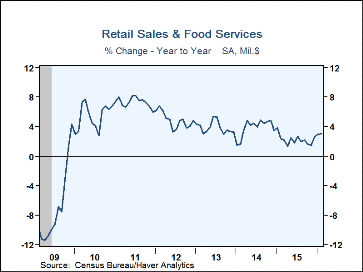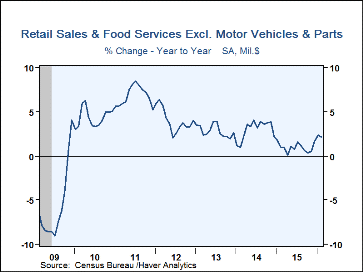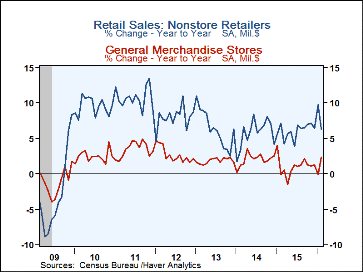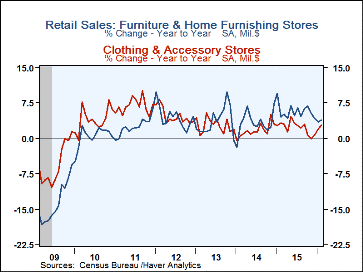 Global| Mar 15 2016
Global| Mar 15 2016U.S. Retail Sales Are Mixed, As Expected
by:Tom Moeller
|in:Economy in Brief
Summary
Retail spending showed little strength in the latest Commerce Department report. Total retail sales & spending at food services eased 0.1% in February (+6.2% y/y) after a 0.4% January decline, last month reported as a 0.2% increase. [...]
Retail spending showed little strength in the latest Commerce Department report. Total retail sales & spending at food services eased 0.1% in February (+6.2% y/y) after a 0.4% January decline, last month reported as a 0.2% increase. Lower gasoline prices contributed the most to the latest decline as service station sales dropped 4.4% (-13.1% y/y) following a 3.3% decline. Overall retail sales excluding gasoline rose 0.2% (4.8% y/y) and made up January's 0.2% drop. The weakness in overall retail sales matched the 0.1% fall-off expected in the Action Economics Forecast Survey.
A second straight 0.2% decline (+10.3%) in auto sales also contributed greatly to the weakness in overall retail spending. The decline matched the drop in unit auto sales reported earlier this month. Excluding autos, retail sales eased 0.1% (+5.1% y/y) after a 0.4% drop, revised from a 0.1% uptick. A 0.2% decline had been expected.
Retail sales fell 0.3% (+5.7% y/y), the same as in January. Weakness in spending was broad-based last month. Furniture & home furnishing store sales dropped 0.5% (+6.5% y/y), off for the third month in the last four. General merchandise store sales declined 0.2% (+5.0% y/y) following a 0.5% drop. Electronics & appliance store sales eased 0.1% (-0.4% y/y) after a 0.2% decline. Sales by nonstore retailers slipped 0.2% (+8.0% y/y), but that followed a 1.6% jump.
Offsetting these declines was improvement in sales of building material & hardware stores which rose 1.6% (17.0% y/y) after a 0.4% drop. Also firm were sales at sporting goods, hobby shop, book & music stores which rose 1.2% (9.2% y/y), although that failed to recover all of the prior month's 2.2% decline. Apparel & accessory outlet sales also improved 0.9% (6.0% y/y) following little change during the prior two months.
Sales in the non-discretionary categories were mixed. Health & personal goods store sales recovered 0.7% (6.9% y/y) following two months of decline. To the downside, however, were food & beverage store sales by 0.2% (+4.5% y/y) following a 0.5% rise.
Restaurant sales gained 1.0% (9.5% y/y) and made up the prior month's decline.
The retail sales figures are available in Haver's USECON database. The Action Economics figures are in the AS1REPNA database.
| Retail Spending (%) | Feb | Jan | Dec | Feb Y/Y | 2015 | 2014 | 2013 |
|---|---|---|---|---|---|---|---|
| Total Retail Sales & Food Services | -0.1 | -0.4 | 0.3 | 6.2 | 2.1 | 3.9 | 3.7 |
| Excluding Autos | -0.1 | -0.4 | 0.4 | 5.1 | 0.9 | 3.1 | 2.7 |
| Non-Auto Less Gasoline, Building Supplies & Food Services | -0.0 | 0.2 | -0.2 | 5.7 | 3.0 | 3.3 | 2.7 |
| Retail Sales | -0.3 | -0.3 | 0.2 | 5.7 | 1.4 | 3.7 | 3.8 |
| Motor Vehicle & Parts | -0.2 | -0.2 | 0.0 | 10.3 | 7.0 | 7.5 | 8.3 |
| Retail Less Autos | -0.3 | -0.3 | 0.2 | 4.3 | -0.2 | 2.6 | 2.6 |
| Gasoline Stations | -4.4 | -3.3 | -1.2 | -13.1 | -19.4 | -2.7 | -0.7 |
| Food Service & Drinking Places Sales | 1.0 | -1.1 | 1.3 | 9.5 | 8.1 | 6.2 | 3.4 |
Tom Moeller
AuthorMore in Author Profile »Prior to joining Haver Analytics in 2000, Mr. Moeller worked as the Economist at Chancellor Capital Management from 1985 to 1999. There, he developed comprehensive economic forecasts and interpreted economic data for equity and fixed income portfolio managers. Also at Chancellor, Mr. Moeller worked as an equity analyst and was responsible for researching and rating companies in the economically sensitive automobile and housing industries for investment in Chancellor’s equity portfolio. Prior to joining Chancellor, Mr. Moeller was an Economist at Citibank from 1979 to 1984. He also analyzed pricing behavior in the metals industry for the Council on Wage and Price Stability in Washington, D.C. In 1999, Mr. Moeller received the award for most accurate forecast from the Forecasters' Club of New York. From 1990 to 1992 he was President of the New York Association for Business Economists. Mr. Moeller earned an M.B.A. in Finance from Fordham University, where he graduated in 1987. He holds a Bachelor of Arts in Economics from George Washington University.










